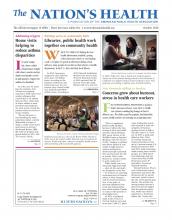Loneliness is prevalent among people living in public senior housing, although such settings may be well suited to reduce loneliness among residents, according to a May study in the Journal of Gerontological Social Work.
When comparing people who live in public senior housing and older adults who live in other settings, the former tend to have increased risk factors for loneliness, the study said. Lower incomes, increased mental and physical health vulnerabilities and being single are all risk factors for loneliness documented among public senior housing residents. Such residences are serving people who may already have risk factors for loneliness, said lead study author Harry Owen Taylor, a doctoral student at the Brown School of Social Work at Washington University in St. Louis.
The study looked at rates of loneliness among residents in three public senior housing communities in the St. Louis area. Researchers asked study participants about companionship, feeling left out and feeling isolated. They also assessed participants’ anxiety symptoms, depressive symptoms, self-rated physical health, levels of social engagement and levels of emotional support. About 70 percent of participants were found to be moderately or severely lonely.
According to the study, the findings show that rates of loneliness are high in senior public housing even though they may have access to resources, support, programs and activities that could mitigate loneliness.
Some of the measures to assess loneliness in the study can be used in real-world settings, including screening for depressive and anxiety symptoms, Taylor said. Residents should also be connected to mental health services as needed.
Senior public housing staff can play an influential role in residents’ social health, Taylor said.
“If (staff are) particularly engaging and they want residents to work hard at engaging with others and and building stronger connections and relationships, then that could be a facilitator to less loneliness and less isolation,” he told The Nation’s Health.
Taylor stressed that staff must be patient when working with seniors to develop relationships and build their social networks.
“It takes time for for a person who’s feeling lonely or isolated to trust other individuals,” he said, adding that it can be particularly challenging to discuss such issues with seniors due to generational gaps in communicating mental health issues.
Senior public housing can harness its existing resources and support systems to help its residents, many of whom are already at higher risk for loneliness than their community-dwelling peers.
“Given proximity and homogeneity of residents, congregate space and programming, and potentially trust relationship(s) with housing staff, these sites have great potential for mitigating loneliness and concurrently addressing depression and anxiety,” the study concluded.
For more information, visit https://www.tandfonline.com/doi/full/10.1080/01634372.2018.1478352.
- Copyright The Nation’s Health, American Public Health Association









